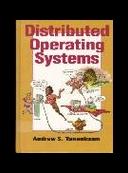Книга: Distributed operating systems
3.1. CLOCK SYNCHRONIZATION
Synchronization in distributed systems is more complicated than in centralized ones because the former have to use distributed algorithms. It is usually not possible (or desirable) to collect all the information about the system in one place, and then let some process examine it and make a decision as is done in the centralized case. In general, distributed algorithms have the following properties:
1. The relevant information is scattered among multiple machines.
2. Processes make decisions based only on local information.
3. A single point of failure in the system should be avoided.
4. No common clock or other precise global time source exists.
The first three points all say that it is unacceptable to collect all the information in a single place for processing. For example, to do resource allocation (assigning I/O devices in a deadlock-free way), it is generally not acceptable to send all the requests to a single manager process, which examines them all and grants or denies requests based on information in its tables. In a large system, such a solution puts a heavy burden on that one process.
Furthermore, having a single point of failure like this makes the system unreliable. Ideally, a distributed system should be more reliable than the individual machines. If one goes down, the rest should be able to continue to function. Having the failure of one machine (e.g., the resource allocator) bring a large number of other machines (its customers) to a grinding halt is the last thing we want. Achieving synchronization without centralization requires doing things in a different way from traditional operating systems.
The last point in the list is also crucial. In a centralized system, time is unambiguous. When a process wants to know the time, it makes a system call and the kernel tells it. If process A asks for the time, and then a little later process 6 asks for the time, the value that B gets will be higher than (or possibly equal to) the value A got. It will certainly not be lower. In a distributed system, achieving agreement on time is not trivial.
Just think, for a moment, about the implications of the lack of global time on the UNIX make program, as a single example. Normally, in UNIX, large programs are split up into multiple source files, so that a change to one source file only requires one file to be recompiled, not all the files. If a program consists of 100 files, not having to recompile everything because one file has been changed greatly increases the speed at which programmers can work.
The way make normally works is simple. When the programmer has finished changing all the source files, he starts make, which examines the times at which all the source and object files were last modified. If the source file input.c has time 2151 and the corresponding object file input.o has time 2150, make knows that input.c has been changed since input.o was created, and thus input.c must be recompiled. On the other hand, if output.c has time 2144 and output.o has time 2145, no compilation is needed here. Thus make goes through all the source files to find out which ones need to be recompiled and calls the compiler to recompile them.
Now imagine what could happen in a distributed system in which there is no global agreement on time. Suppose that output.o has time 2144 as above, and shortly thereafter output.c is modified but is assigned time 2143 because the clock on its machine is slightly slow, as shown in Fig. 3-1. Make will not call the compiler. The resulting executable binary program will then contain a mixture of object files from the old sources and the new sources. It will probably not work, and the programmer will go crazy trying to understand what is wrong with the code.

Fig. 3-1. When each machine has its own clock, an event that occurred after another event may nevertheless be assigned an earlier time.
Since time is so basic to the way people think, and the effect of not having all the clocks synchronized can be so dramatic, as we have just seen, it is fitting that we begin our study of synchronization with the simple question: Is it possible to synchronize all the clocks in a distributed system?
- 3.1.4. Use of Synchronized Clocks
- 3.1.1. Logical Clocks
- 3.1.3. Clock Synchronization Algorithms
- 6.4.8. Synchronization
- 10.2.3. Synchronization
- 15.2 Synchronization
- 7.1 Extended synchronization
- 3 Synchronization in Distributed Systems
- 3 Synchronization
- 15.4 Resource Synchronization Methods
- 15.6.1 Synchronous Activity Synchronization
- 1.3.2 The Clock




